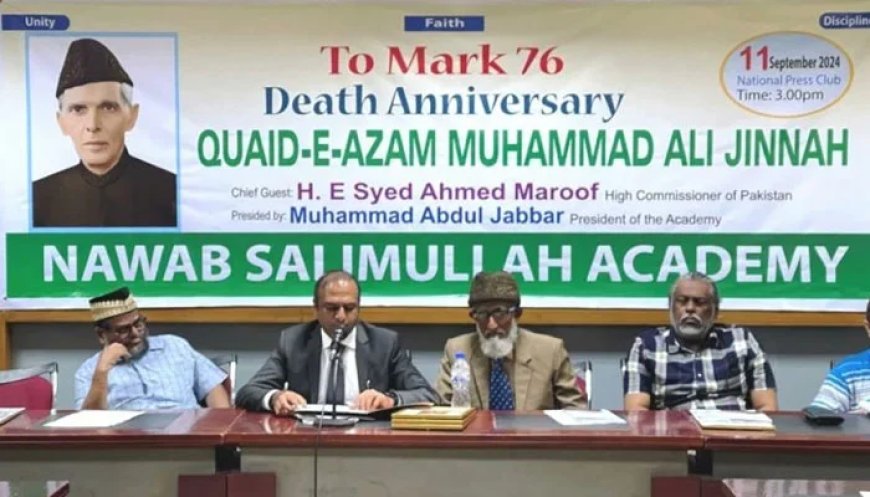In a first, Quaid-i-Azam's death anniversary commemorated in Bangladesh

1. "Bangladesh gained independence because of Pakistan, which Jinnah helped create," says speaker
For the first time in Bangladesh's history, Quaid-i-Azam Muhammad Ali Jinnah's death anniversary was commemorated in Dhaka. The event marked the 76th anniversary of Jinnah, featuring the recitation of Urdu poetry and performances of Urdu songs in the capital, as reported by the *Dhaka Tribune* on Thursday.
According to the publication, the commemoration was organized by the Nawab Salimullah Academy at the Tofazzal Hossain Manik Miah Hall in the National Press Club, Dhaka. The Pakistani High Commissioner to Bangladesh was expected to attend as the chief guest, but he could not be present. Instead, Deputy High Commissioner Kamran Dhangal was in attendance.
Prof. Dr. Mostafizur Rahman presented a keynote paper outlining Jinnah's life, and the event was graced by the academy's president, Muhammad Abdul Jabbar, and journalist Mostafa Kamal Mojumder. Poet Jafarul Haq Jafar recited an Urdu poem, and two Pakistani students studying in Bangladesh performed songs in Urdu.
Md Samsuddin, convener of the event from Nagorik Parishad, remarked, "If Bangladesh had not been part of Pakistan in 1947, we would be in the same position as Kashmir today, with the Indian junta holding weapons to our necks. Bangladesh gained independence because of Pakistan, which Jinnah helped create." He also expressed his view that changes such as renaming Allama Iqbal Hall and Jinnah Avenue were driven by Delhi's influence, adding that Bangladesh should strengthen ties with China and Pakistan.
Speakers at the event praised Jinnah's role in the creation of Pakistan, asserting that Bangladesh would not have existed without him. Nazrul Islam, one of the speakers, noted that Jinnah was "the father of our nation," and emphasized the need to preserve ties with Pakistan, hoping that Jinnah's birth and death anniversaries would continue to be observed in Bangladesh.
Another attendee lauded Jinnah for ending the "political incompetence and strife" facing the Indian subcontinent after 1857, asserting that had Jinnah not taken responsibility for Bangladesh in 1947, the region would have remained part of India, much like West Bengal. He urged the current leadership in Bangladesh to reassess the country's relationship with Pakistan.
Deputy High Commissioner Kamran Dhangal commended Jinnah's leadership of the Muslim League, describing it as "outstanding." He added, "Jinnah’s vision for the new nation was clear. He advocated for a progressive and inclusive state, reflecting a commitment to freedom and tolerance. His contributions are revered not only in Pakistan but across the world."


















































